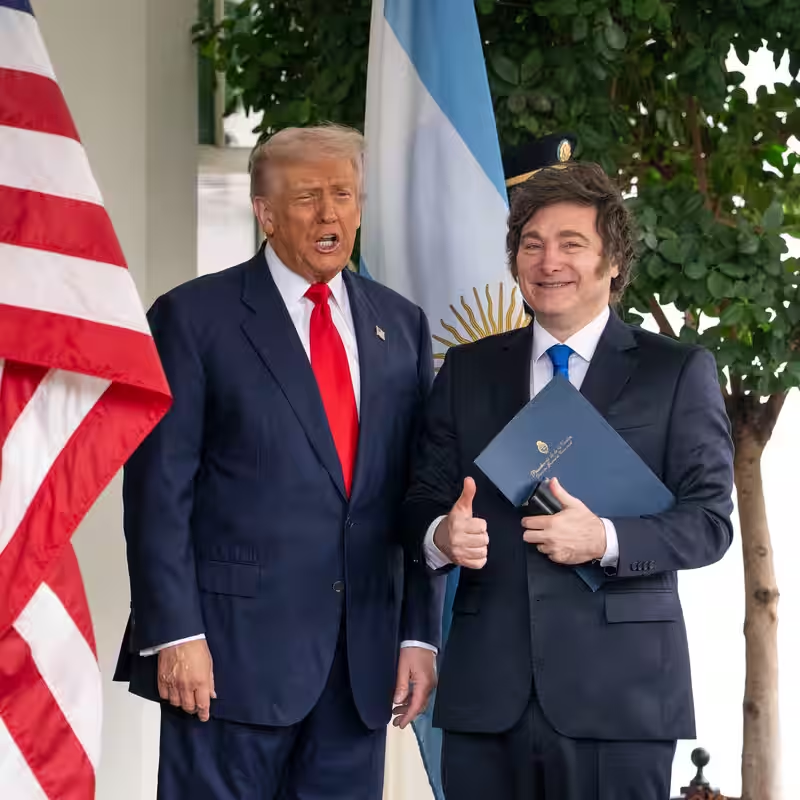In a move echoing decades of U.S. foreign policy precedent, former President Donald Trump has inserted himself into Argentina’s domestic politics—publicly endorsing President Javier Milei and amplifying his campaign just weeks before a critical legislative vote. The intervention has reignited debate over America’s role in shaping elections beyond its borders.
Trump Backs Milei: A Strategic Alliance?
Speaking at a campaign-style rally in Florida last week, Trump praised Milei as “a true fighter for freedom” and “the only leader who gets it.” The remarks, broadcast widely on Argentine media, came as Milei faces growing opposition over austerity measures and economic reforms that have sparked nationwide protests.
While Trump is not currently in office, his influence remains potent—especially among right-wing leaders in Latin America who view him as a model for anti-establishment governance. Milei, a libertarian economist known for his fiery rhetoric and chainsaw-wielding stunts, has openly modeled his political persona after Trump, even calling him “the greatest president of the 21st century.”
A Long History of U.S. Election Meddling
Trump’s involvement is not an isolated incident. It fits into a well-documented pattern of American intervention in foreign elections—sometimes overt, often covert. From Chile in 1970 to Ukraine in 2004 and beyond, U.S. actions have frequently tipped the scales in favor of preferred candidates.
What makes the Argentina case unusual is its openness. Rather than intelligence operations or backchannel funding, this is influence wielded through media, personal endorsement, and transnational political branding.
U.S. Involvement in Foreign Elections: Key Examples
| Year | Country | U.S. Action |
|---|---|---|
| 1953 | Iran | CIA-backed coup ousted PM Mossadegh. |
| 1970 | Chile | Funding opposition to Salvador Allende. |
| 2004 | Ukraine | Support for Orange Revolution leaders. |
| 2025 | Argentina | Trump publicly endorses Milei ahead of key vote. |
Argentine Reactions: Divided Public
Inside Argentina, Trump’s endorsement has become a double-edged sword. Milei’s supporters hail it as validation from a global conservative icon. “If Trump believes in us, the world should too,” said one rally attendee in Buenos Aires.
But critics warn it fuels nationalist backlash. Opposition leader Patricia Bullrich called the intervention “unacceptable,” stating, “Argentina’s future must be decided by Argentines—not by ex-presidents in Mar-a-Lago.” Polls show nearly 60% of citizens oppose foreign interference, regardless of political leaning.
Geopolitical Stakes for the U.S.
Why Argentina? Beyond ideological alignment, the South American nation holds strategic value. It’s a major lithium producer—critical for electric vehicle batteries—and a potential counterweight to Chinese influence in the region. A stable, U.S.-friendly government in Buenos Aires aligns with broader American economic and security interests.
Yet experts caution that overt backing can backfire. “When a foreign leader becomes a campaign symbol, it often galvanizes the opposition,” said Dr. Elena Ruiz, a Latin America analyst at Georgetown University. “Trump may be helping Milei with his base—but he’s also giving his enemies a powerful rallying cry.”
What Happens Next?
With Argentina’s November 10 legislative elections looming, all eyes are on whether Trump’s endorsement translates into votes—or backlash. Either way, his involvement has already reshaped the narrative, turning a domestic economic debate into a proxy battle over sovereignty, foreign influence, and the legacy of American power in Latin America.




